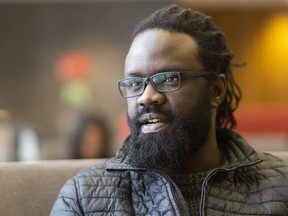When London filmmaker Moses Latigo Odida walks out the door, a world of stereotypes awaits.

When London filmmaker Moses Latigo Odida walks out the door, a world of stereotypes awaits.
Advertisement 2
Article content
Picking up an item for his four-year-old purchased through Facebook has required Odida’s wife, who’s white, to “alert” the seller her husband, who’s picking up the item, is Black.
Article content
“When I go to some places, people have invariably been stand-offish or there has been some type of response or reaction in a situation that I now find it necessary to announce myself,” Odida said.
The conversation about stereotypes became a regular practice in Odida’s household, especially after he and his wife found out their child would be born with Down syndrome, another group hit by harmful stereotypes.
Adding another layer of labels is Odida’s long struggle with clinical depression.
At the time of his daughter’s birth in 2019, he was experiencing one of the “darkest moments” of his life. “So dark” that Odida contemplated the “worthwhileness of life.”
Advertisement 3
Article content
“Then, when Selah was born, I had this renewed determination to be the best father I could be for her,” he said.
Odida went on a search for support. He looked for Black parents who are caregivers to children with different abilities, but who also understand the experience of being Black and dealing with a mental illness.
“I knew that I needed all the help so I could be the healthy father that I needed to be for her,” Odida said. “What I knew then, being born and raised in Uganda, is that we often approach the problem by solving it within the community.”
Odida searched for ubuntu, an African principle meaning “humanity to others,” described as I am what I am because of who we all are.
A former volunteer of a refugee settlement in Uganda, Odida always had a “real conviction that storytelling is integral to justice.”
Advertisement 4
Article content
The help and community Odida for which long took him far from London, on a journey to the Canadian coasts, from Nova Scotia to British Columbia, requiring him to be at his “most vulnerable.”
Recommended from Editorial
His starting point was a simple Google search of Black caregivers in Canada. “There wasn’t a lot, which I wasn’t surprised,” he said, but once Odida introduced himself, other caregivers connected him to the community.
Odida pitched a story to the web series Stories for Caregivers, an initiative by BC producer Bannister Bergen to raise awareness about caregiving.
“I wasn’t confident in my application. I didn’t have any work to show that would convince decision-makers that I could do it alone,” Odida said. “What I had was the intention to focus on Black stories. My approach was to tell my story and also serve as motivation to other caregivers.”
The web series debuted on Monday, Jan. 22, on the Stories For Caregivers YouTube channel.
“Up to this series, I had not seen any stories of caregivers in the same way as I’ve seen others around. So, I wanted to contribute to these stories and experiences,” he said.
Advertisement 5
Article content
Down – a mini-documentary of eight episodes directed and written by Odida in 2023 – tells stories of Black caregivers, bringing up conversations he says need to happen in the Black community about mental illness and disability.
“Conversations that many of us (Black people) have not grown up having any exposure to talking about,” Odida said. “I also wanted to balance that with the joy that our lives are also characterized by.”
The series highlights realities, such as feeling emotionally down because of the challenges caregivers face, remaining down under ongoing responsibility of raising disabled loved ones, including those born with Down syndrome.
“There is a necessity to inform the general Canadian public about the unique experiences of Black caregivers so the audience can be better informed as advocates for them,” Odida said.
He realized he had found a “village” of people like him through interviews with Black caregivers, their families, and experts, people who will help him “walk through this life of providing care,” he said.
“This is a journey that I want to document so that not only can I hold myself accountable to that process,” Odida said. “But that I can also hopefully motivate or inspire others, too.”
If you’re looking for support, help is available at blackmentalhealth.ca or 1-833-456-4566.
Article content

